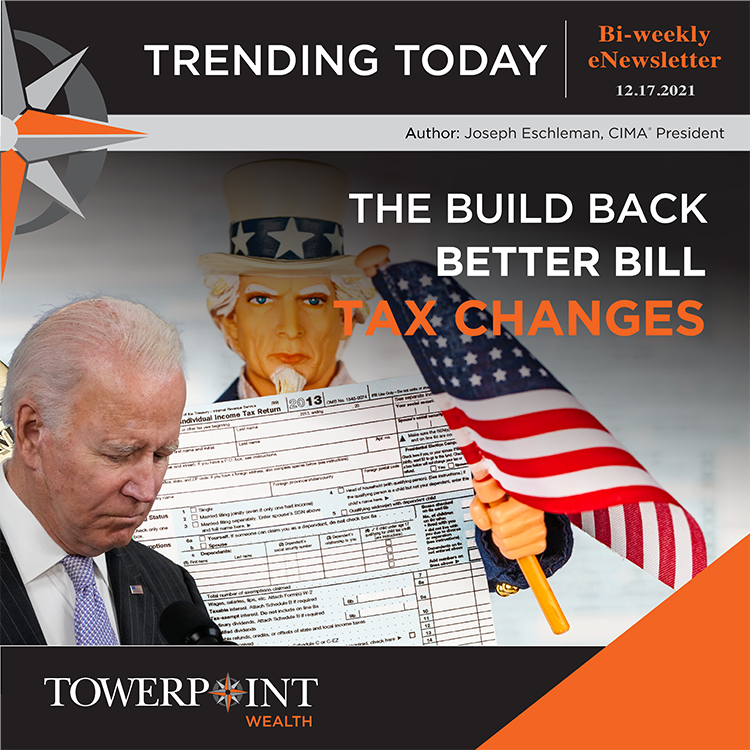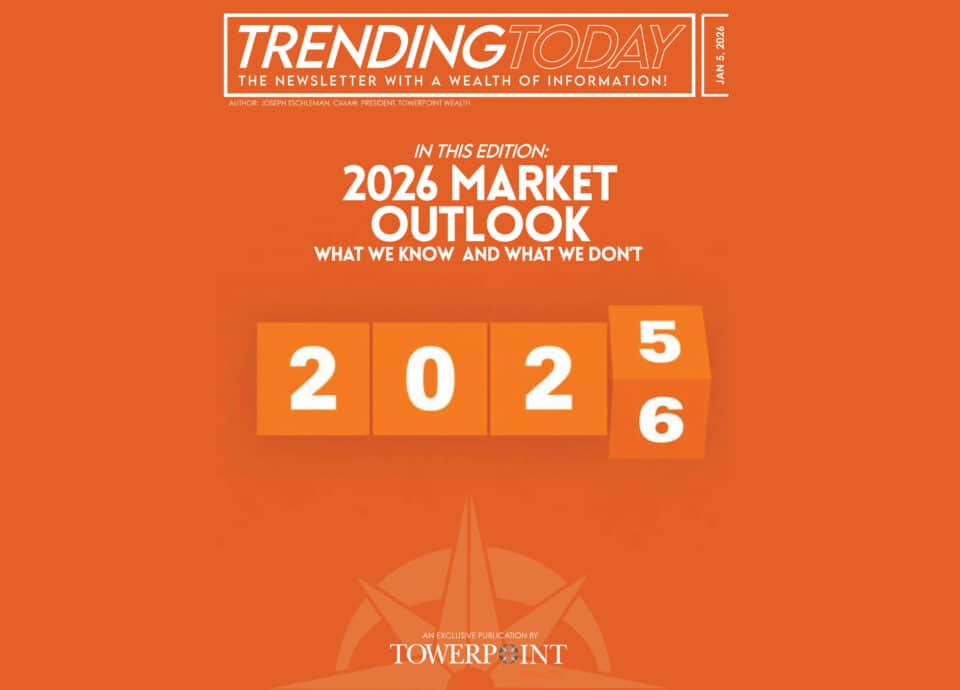
The Build Back Better Bill tax changes – do you stand to pay MORE, or less?

Will the Build Back Better bill tax changes translate to an unexpected de-facto holiday bonus, or instead, an unwelcome lump of coal? Read on to find out more!
While Build Back Better is a good marketing slogan, it is obviously important to unpack and better understand what this 2,135 page, $1.75 trillion piece of spending and legislation might mean for YOU. What exactly are the key provisions of this signature bill, and importantly, will the proposed Build Back Better Bill tax changes cause you to pay MORE or LESS to Uncle Sam if the proposed legislation passes?

Let’s briefly “unpack” the Build Back Better Act, discuss which provisions are NOW being negotiated in the Senate, and importantly, evaluate the potential Build Back Better bill tax changes, and the tax consequences of what a final package might look like.
First, a brief background. The Build Back Better Act is the third and most economically significant part of President Biden’s Build Back Better Plan. Originally an immense $3.5 trillion social spending package, lawmakers in the House of Representatives have scrambled and negotiated over the past six months, finally ending up here – approving and sending to the Senate a “slimmed-down” (but hardly modest) $1.75 trillion (!) version of the plan. Now, the REAL debate and negotiations begin.
With two noteworthy holdouts…

...Senate Democrats are mostly united in passing this major legislation, but haven’t yet been able to agree on what should be kept and what should be scrapped to obtain the two needed votes from the aforementioned holdouts. On the flip side, and unsurprisingly in today’s partisan political atmosphere, all 50 Senate Republicans are aligned against it.
Now, regardless of whether you are a Democrat or a Republican, and regardless of whether you agree or disagree with the need to pass this IMMENSE bill, at Towerpoint Wealth we believe that it is a when, and not an if, some version of this legislation ultimately DOES pass and become law, even if it isn’t until 2022. And while the final terms are obviously still unclear, the bill is proposing to make MAJOR changes to four main areas:
1. Social services and programs
2. Clean energy
3. Immigration
4. Build Back Better bill tax changes
And as Joe Manchin, Senator from West Virginia and one of the two Democratic holdouts who is squarely in the middle of this debate, said earlier about the bill, “We should be very careful what we do. We get any of these wrong, we’re in trouble.”
If you are interested in a deeper breakdown of the first three areas (as well as Build Back Better tax changes highlighted below), we encourage you to click the thumbnail below and watch our newly-produced educational video:
Today’s Trending Today is specifically focused on the proposed Build Back Better bill tax changes, which would raise a SIGNIFICANT amount of tax revenue from the very wealthy and corporations, and also offer a proposed tax cut for those who live in high income and mostly blue tax states.
The Congressional Budget Office (CBO) estimates the bill will cost a total of almost $1.7 trillion, and add $367 billion to the federal deficit over 10 years. Adding in $207 billion of revenue that is estimated to result from increased tax enforcement in the bill, and the net total increase to the deficit is projected to be $160 billion.
Originally, President Biden’s initial Build Back Better plan was to raise taxes on families earning more than $400,000/year, which would have overturned the Tax Cuts and Jobs Act passed in 2017. However, this provision was dropped in the final version of the bill passed by the House of Representatives on November 19, as holdout Democratic Senator Kyrsten Sinema of Arizona balked at it, saying she wouldn’t accept any additional higher tax rates: not for individuals, not for capital gains, and not for corporations.
Instead, a significant and updated House-passed Build Back Better bill tax change imposes surtaxes on taxpayers with extremely high incomes. When would this surtax kick in? When adjusted gross income eclipses $10 million, a 5% surtax on income would be applied. Additionally, taxpayers would be subject to an additional 3% surtax on any income over $25 million. Clearly these proposed Build Back Better bill tax changes would only be punitive to very high income earners.

Something else to keep in mind – the new surtaxes applicable to the $10 million and $25 million adjusted gross income thresholds INCLUDES capital gains taxes. So, if you have owned highly appreciated securities (think Apple or Tesla or Amazon stock) for a long time, and then sell your shares and realize a large capital gain, that income is also included when calculating whether or not you would be subject to them.
Additionally, another major Build Back Better bill tax change would be to INCREASE the state and local income tax deduction, commonly known as the SALT deduction.

The SALT deduction is a tax deduction that allows taxpayers of high-tax states to deduct local tax payments on their federal tax returns. Before 2017, there was no limitation on the SALT deduction. However, under the Trump administration’s Tax Cuts and Jobs Act, the SALT deduction was CAPPED at $10,000. The Build Back Better bill tax change to SALT proposes a new INCREASED deduction limit of $80,000, benefitting wealthier residents of high-tax blue states like California, New Jersey, and New York.

This change would cost the government $229 billion in revenue, and was not part of Biden’s original BBB plan – it was added later in the House negotiations.
Backdoor Roth IRA conversions, a popular technique oftentimes used to fund a tax-free Roth IRA without being subject to the Roth IRA income limitations, would also be eliminated as another Build Back Better bill tax change.

And lastly, income recognized on cryptocurrency transactions would be subject to 1099 reporting by crypto brokers and custodians.
Here is a visual summary of the Build Back Better bill tax changes:

Head spinning yet? Obviously the myriad of proposed Build Back Better bill tax changes is a lot to keep track of. However, at Towerpoint Wealth, that is exactly what we continue to do on a regular basis.
Considered by some to be the most consequential economic legislation in the past 50 years, negotiations on the Build Back Better bill are far from over. And any tweaks to this massive legislation will then require another vote in the House. However, regardless of how and when this situation plays itself out, we feel it is safe to say that YOU WILL feel the effects of at least one component of the proposed Build Back Better bill tax changes, and encourage you to contact us to have an objective conversation about how you will be positively or negatively affected by the tax changes you will personally see from this bill.
What’s Happening at TPW?
A huge thank you to Ascent Builders for the AMAZING holiday wreath, and perhaps an even better gift, the personal delivery from their esteemed controller, Patty McElwain (holding the wreath and standing next to our phenomenal Client Service Specialist, Michelle Venezia)!
Spreading cheer is an Ascent Builders specialty, and they are a firm we feel very fortunate to have such a long and productive partnership with.

Our President, Joseph Eschleman, spent some time earlier this month celebrating Christmas (yes, that is a Griswold Family Christmas t-shirt he is wearing!) with close Towerpoint Wealth friend and business partner, Niki Dawson. Niki is the President of TaylorMade Web Creations, and she is absolutely amazing if you have any web design and/or digital marketing needs!

Graph of the Week
Tesla’s market value is now more than General Motors, Ford, Volkswagen, and Mercedes-Benz, COMBINED!
The below chart indicates that electric vehicle sales will exceed gas-powered vehicles by 2040 – do you agree? Disagree?

Cartoon of the Week
We came across this gem that provides a different and unique “take” capturing the essence of what perseverance means, and felt compelled to share!

Illustration of the Week
Surprisingly, in the wealth management industry, there are two different standards of care for clients:
- The fiduciary standard – a legal obligation requiring a financial advisor to act solely in a client’s best interest, 100% of the time, when offering personalized financial advice, counsel, and planning
- The suitability standard – a much lower legal hurdle to clear than fiduciary, not obligating a financial advisor to put their client’s best interests first, and instead only requires a reasonable belief that a recommendation is “suitable” for a client
While we believe that consumers and clients are harmed with the absence of a uniform fiduciary standard that applies to ALL financial professionals, this is the world we live in. A non-fiduciary is legally allowed to sell you a product or investment that pays the highest commission, as long as it is considered suitable.
If you have an advisor who works for any of these firms, he or she is NOT a fiduciary to you. Conversely, if you are working with an advisor at a fully-independent, SEC-regulated investment advisory firm (such as Towerpoint Wealth), he or she IS a fiduciary to you!

Put differently…

Trending Today
As the 24/7 news cycle churns, twists, and turns, a number of trending and notable events have occurred over the past few weeks:
- Underlining the dramatic surge in infections the country continues to see, the U.K. reported a record number of new daily COVID-19 cases on Wednesday, with 78,610
- The U.S. House of Representatives voted on Tuesday to hold former White House chief of staff Mark Meadows in contempt, over defiance of January 6 Committee subpoena
- Businesses, employers, and universities begin mandating COVID-19 booster shots
- The rematch? Hillary vs. Trump in 2024?
- Steph Curry gives new Rolexes to Draymond Green and Andre Iguodala after sinking his 2,974th career 3-pointer, breaking Ray Allen’s NBA record
- Iconic American musician Bruce Springsteen reportedly sold his full song and publishing catalog to Sony Music for a whopping $500 million
- Hackers linked with governments of China, Iran, North Korea, and Turkey are exploiting a critical flaw in software used by big tech firms around the world
As always, we sincerely value our relationships and partnerships with each of you, as well as your trust and confidence in us here at Towerpoint Wealth. We encourage you to reach out to us at any time (916-405-9140, info@towerpointwealth.com) with any questions, concerns, or needs you may have. The world continues to be an extremely unsettled and complicated place, and we are here to help you properly plan for and make sense of it.
Joseph Eschleman, Jonathan, Steve, Lori, Nathan, and Michelle

We love social media, and are always actively growing our social media community!
Follow us on any of these platforms you use, and then message us with your favorite charity, and we will happily donate $10 to it!
Click HERE to follow Towerpoint Wealth on LinkedIn
Click HERE to follow Towerpoint Wealth on Facebook
Click HERE to follow Towerpoint Wealth on Instagram
Click HERE to follow Towerpoint Wealth on Twitter
Click HERE to follow Towerpoint Wealth YouTube
Click HERE to follow Towerpoint Wealth Podcast A Wealth of Knowledge







